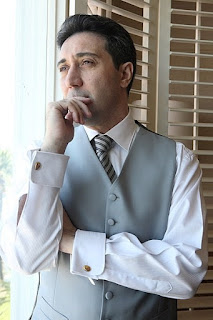Tito Gobbi – baritone
Singer found fame on both stage and screen
Opera singer Tito Gobbi was born on this day in 1913 in Bassano del Grappa in the Veneto region. He had a career that lasted 44 years and sang more than 100 different operatic roles on stages all over the world. Gobbi also sang in 25 films and towards the end of his career directed opera productions throughout Europe and America. His singing talent was discovered by a family friend while he was studying law at the University of Padua, who suggested that he studied singing instead. As a result, Gobbi moved to Rome in 1932 to study under the tenor, Giulio Crimi. At his first audition he was accompanied at the piano by Tilde De Rensis, the daughter of musicologist Raphael De Rensis. She was later to become Gobbi’s wife. Gobbi made his debut in 1935 in Gubbio, singing the role of Count Rodolfo in Vincenzo Bellini’s La sonnambula, and then went to work for a season at La Scala in Milan as an understudy, which gained him valuable experience. He made his first appearance on stage there as the Herald in Ildebrando Pizzetti’s Orseolo. In 1942 he sang the role of Belcore in Donizetti’s L’elisir d’amore at La Scala, conducted by Tullio Serafin. Read more…
_________________________________________________________________
Sir Moses Montefiore - businessman
Italian-born philanthropist who made his fortune in London
The businessman and philanthropist Sir Moses Montefiore, who made his fortune in England and became a prominent supporter of Jewish rights, was born in Livorno on this day in 1784. Born into a Sephardic Jewish family, his grandfather, Moses Vita (Haim) Montefiore, had emigrated from Livorno to London in the 1740s, but regularly returned to Italy, as did other members of the family. Moses Montefiore was born while his parents, Joseph Elias and Rachel - whose father, Abraham Mocatta, was a powerful bullion broker in London - were in Livorno on business. Their son was to amass considerable wealth in his working life, accumulating such a fortune on the London stock exchange he was able to retire at 40, but in his youth his family’s situation was so perilous he had to abandon his education without qualifications in order to find a job. First apprenticed to a firm of grocers and tea merchants, he left to become one of 12 so-called ‘Jew brokers’ in the City of London. His early days in the city were not without setbacks, notably when a major fraud in 1806 caused him to lose most of his clients’ money and cost him his broker’s licence. Read more…
__________________________________________________________________
Luciano Berio – composer
War casualty who became significant figure in Italian music
The avant-garde composer Luciano Berio, whose substantial catalogue of diverse work made him one of the most significant figures in music in Italy in the modern era, was born on this day in 1925 in Oneglia, on the Ligurian coast. Noted for his innovative combining of voices and instruments and his pioneering of electronic music, Berio composed more than 170 pieces between 1937 and his death in 2003. His most famous works are Sinfonia, a composition for orchestra and eight voices in five movements commissioned by the New York Philharmonic Orchestra in 1968, and dedicated to the conductor Leonard Bernstein, and his Sequenza series of 18 virtuoso solo works that each featured a different instrument, or in one case a female voice alone. Berio's musical fascinations included Italian opera, particularly Monteverdi and Verdi, the 20th-century modernism of Stravinsky, the Romantic symphonies of Schubert, Brahams and Mahler, folk songs, jazz and the music of the Beatles. All these forms influenced him in one way or another and even his most experimental work paid homage to the past. Read more…
Home













